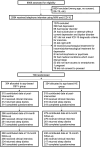Effectiveness of app-based cognitive behavioral therapy for insomnia on preventing major depressive disorder in youth with insomnia and subclinical depression: A randomized clinical trial
- PMID: 39836656
- PMCID: PMC11750088
- DOI: 10.1371/journal.pmed.1004510
Effectiveness of app-based cognitive behavioral therapy for insomnia on preventing major depressive disorder in youth with insomnia and subclinical depression: A randomized clinical trial
Abstract
Background: Increasing evidence suggests that insomnia plays an important role in the development of depression, supporting insomnia intervention as a promising approach to prevent depression in youth. This randomized controlled trial evaluated the effectiveness of app-based cognitive behavioral therapy for insomnia (CBT-I) in preventing future onset of major depressive disorder (MDD) in youth.
Methods and findings: This was a randomized, assessor-blind, parallel group-controlled trial in Chinese youth (aged 15-25 years) with insomnia disorder and subclinical depressive symptoms. Participants were randomly assigned (1:1) to 6-week app-based CBT-I or 6-week app-based health education (HE) delivered through smartphones. Online assessments and telephone clinical interviews were conducted at baseline, post-intervention, 6- and 12-month follow-ups. The primary outcome was time to onset of MDD. The secondary outcomes included depressive symptoms and insomnia at both symptom and disorder levels. Between September 9, 2019, and November 25, 2022, 708 participants (407 females [57%]; mean age, 22.1 years [SD = 1.9]) were randomly allocated to app-based CBT-I group (n = 354) or app-based HE group (n = 354). Thirty-seven participants (10%) in the intervention group and 62 participants (18%) in the control group developed new-onset MDD throughout the 12-month follow-up, with a hazard ratio of 0.58 (95% confidence interval 0.38-0.87; p = 0.008). The number needed to treat to prevent MDD at 1 year was 10.9 (6.8-26.6). The app-based CBT-I group has higher remission rates of insomnia disorder than the controls at post-intervention (52% versus 28%; relative risk 1.83 [1.49-2.24]; p < 0.001) and throughout 12-month follow-up. In addition, the CBT-I group reported a greater decrease in depressive (adjusted difference -1.0 [-1.6 to -0.5]; Cohen's d = 0.53; p < 0.001) and insomnia symptoms (-2.0 [-2.7 to -1.3], d = 0.78; p < 0.001) than the controls at post-intervention and throughout 6-month follow-up. Insomnia was a mediator of intervention effects on depression. No adverse events related to the interventions were reported.
Conclusions: App-based CBT-I is effective in preventing future onset of major depression and improving insomnia outcomes among youth with insomnia and subclinical depression. These findings highlight the importance of targeting insomnia to prevent the onset of MDD and emphasize the need for wider dissemination of digital CBT-I to promote sleep and mental health in the youth population.
Trial registration: ClinicalTrials.Gov (NCT04069247).
Copyright: © 2025 Chen et al. This is an open access article distributed under the terms of the Creative Commons Attribution License, which permits unrestricted use, distribution, and reproduction in any medium, provided the original author and source are credited.
Conflict of interest statement
I have read the journal’s policy and the authors of this manuscript have the following competing interests: YKW received personal fees from Eisai Co, Ltd, for delivering a lecture and Consultation, and sponsorship from Lundbeck HK Ltd and Aculys Pharma, Inc outside the submitted work. CMM received research support from Idorsia, Eisai and Lallemand Health Solutions, personal fees from Idorsia, Eisai and Haleon, and received royalties from Mapi Research Trust outside the submitted work. JHZ provided consultancy for BestCare & SuMian BioTech Co, Ltd. JWYC received personal fee from Eisai Co., Ltd and travel support from Lundbeck HK limited for overseas conference outside the submitted work. The other authors have declared that no competing interests exist (SJC, QJY, NYC, LS, SXL, WZH, CXC, CCT, YLH, and LL).
Figures



References
-
- Chen S-J, Zhang J-H, Li SX, Tsang CC, Chan KCC, Au CT, et al. The trajectories and associations of eveningness and insomnia with daytime sleepiness, depression and suicidal ideation in adolescents: a 3-year longitudinal study. J Affect Disord. 2021;294:533–42. doi: 10.1016/j.jad.2021.07.033 - DOI - PubMed
Publication types
MeSH terms
Associated data
LinkOut - more resources
Full Text Sources
Medical

